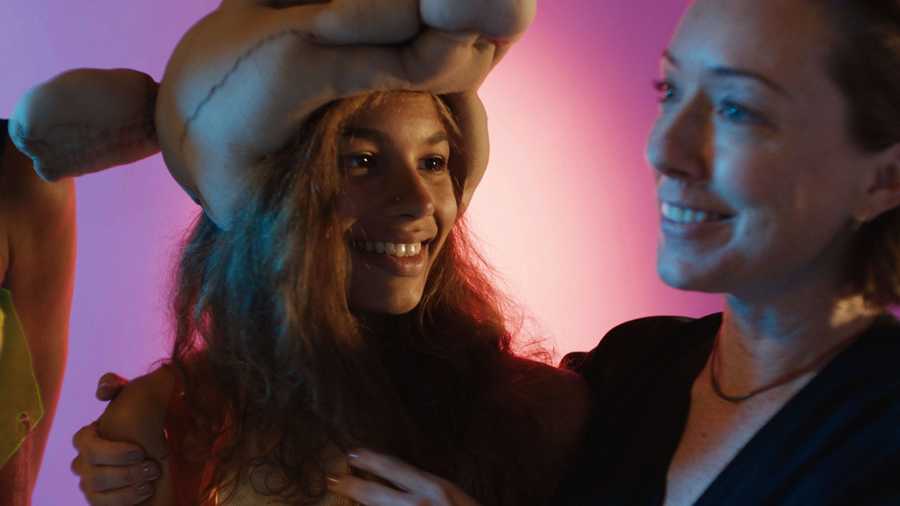
We turn first to IndieWire’s David Ehrlich: “‘The emotions you are having are not your own, they are someone else’s. You are not the cat—you are inside the cat.’ So begins Josephine Decker’s Madeline’s Madeline, an ecstatically disorienting experience that defines its terms right from the start and then obliterates any trace of traditional film language, achieving a cinematic aphasia that allows Decker to redraw the boundaries between the stories we tell and the people we tell them about. The result is an experimental movie with the emotional tug of a mainstream hit, a fragmented coming-of-age drama that explores the vast space between Hollis Frampton and Greta Gerwig in order to find something truly new and ineffably of its time. This is one of the boldest and most invigorating American films of the twenty-first century.”
“Among its other astonishments,” writes the New Yorker’s Richard Brody, the film “does something very simple: it dispels the shibboleth that movies spotlighting strong and original performances differ from ones that innovate at the level of cinematic style. Madeline’s Madeline does both, with equal intensity. Decker’s film, in its dramatic contours, is an utterly clear and classical drama about a Queens family. Miranda July plays Regina, an excessive, boundary-challenged, somewhat out-of-control single mother of a sixteen-year-old girl named Madeline (Helena Howard). Madeline, who is confronting mental illness, is an acting prodigy and the youngest member of a Manhattan-based experimental-theatre company run by a director (Molly Parker) who is emotionally vampirizing Madeline to sustain her own artistry.”
“Is this a great movie?” wonders Filmmaker’s Vadim Rizov. “I’m not sure it is, but Josephine Decker’s feature has ambition and the desire for greatness in spades.” Her Butter on the Latch (2013) and Thou Wast Mild and Lovely (2014) “both start as clearly agitated but at least ostensibly normal narratives, then turn into remakes of The Shining in the home stretch, burning down an unresolvable narrative morass seemingly out of frustration—in both cases, it seemed like a pyromaniac punt I couldn’t hang with. . . . Madeline’s Madeline rectifies this back-half gearshift by being bonkers from the start: it’s clear from the get-go that we’re trapped in a subjective POV that’s already fallen apart, so there’s no ground to lose.”
“While Molly Parker delivers a fine performance as a strong, creative woman belying a greater vulnerability, young discovery Helena Howard is a fierce and fiery on-screen presence, with a wide open-face and an alluring gap-toothed smile,” writes Anthony Kaufman for Screen. “When Howard’s Madeline reenacts a traumatic exchange between her character and her mother for her theater troupe, it’s a show-stopping moment, full of sadness and rage, which bowls over her fellow actors—as well as the viewer.”
“Shot by cinematographer Ashley Connor,” notes Jordan Raup at the Film Stage, “there’s a warm vivacity to the palette and an unexpected verve, as if one could never guess what the next shot will be, including experimental Punch-Drunk Love-esque color abstraction to a wholly enveloping finale that moves with the startling boldness of mother!’s third act. To further place us Madeline’s head space, the sound design accentuates her heavy breathing through fraught sequences of conflict and performance, which, in this film, are rendered one in the same.”
“None of the techniques Decker and her collaborators use would be as effective as they are without the almost extraordinary contributions by Howard,” writes Gregory Ellwood at the Playlist. “This is the nineteen-year-old’s professional acting debut and her presence isn’t electric just because of her inherent natural on-screen charisma. No, in Howard’s hands Madeline’s mental issues never hint at a false sense of authenticity and, when the story calls for it, she evokes a guttural fury that is simply spectacular to watch.”
For Ben Umstead at ScreenAnarchy, “Madeline’s Madeline is what we mean when we talk about authentic cinema; pure cinema, brimming over with euphoria and empathy and a direct perspective of a human, both inside and out, mental and physical, that feels so complete as to be dizzying.”
“I met Helena Howard while judging a Teen Arts Festival in New Jersey,” Decker tells Women and Hollywood. “She is talented—I mean talented—and so we decided to build something around her artistry. That very process of building went, well, not as expected, and eventually became the content of the film itself.”
Decker also talks to Filmmaker and to Ioncinema, where you’ll also find interviews with Decker, Helena Howard, editor Harrison Atkins, and cinematographer Ashley Connor—who also talks to the Credits.
For news and items of interest throughout the day, every day, follow @CriterionDaily.
from The Criterion Current http://ift.tt/2ndstVD
Nessun commento:
Posta un commento